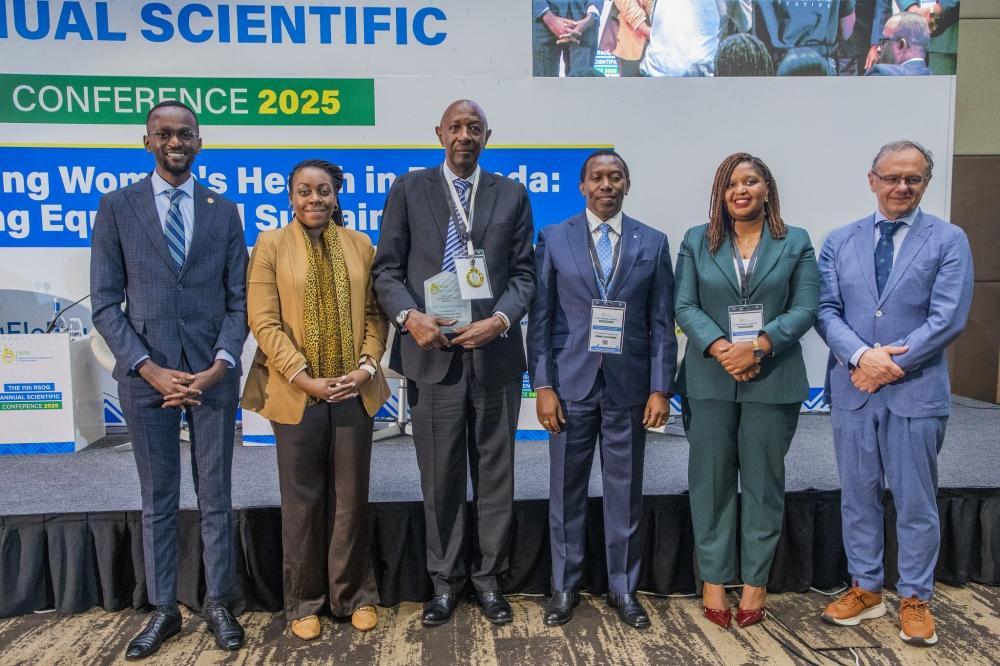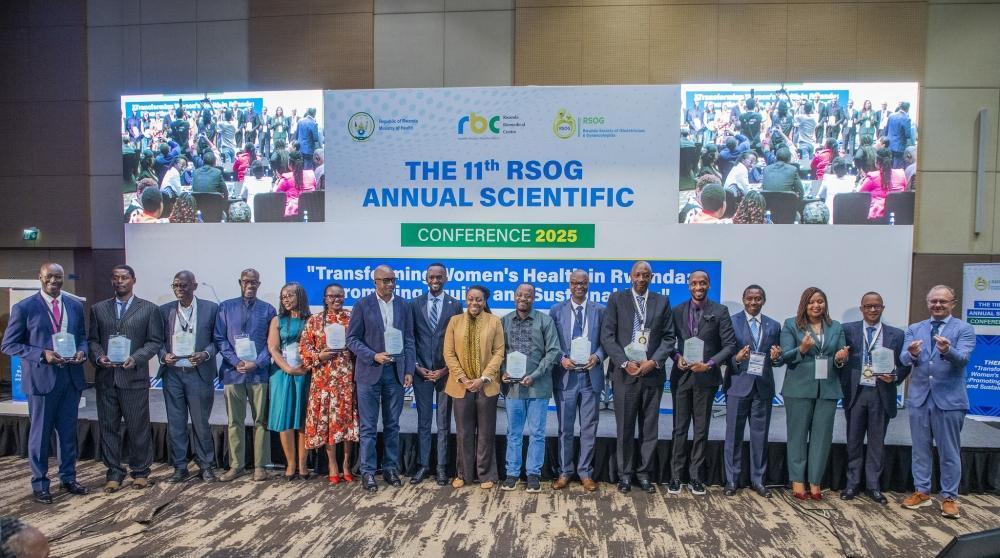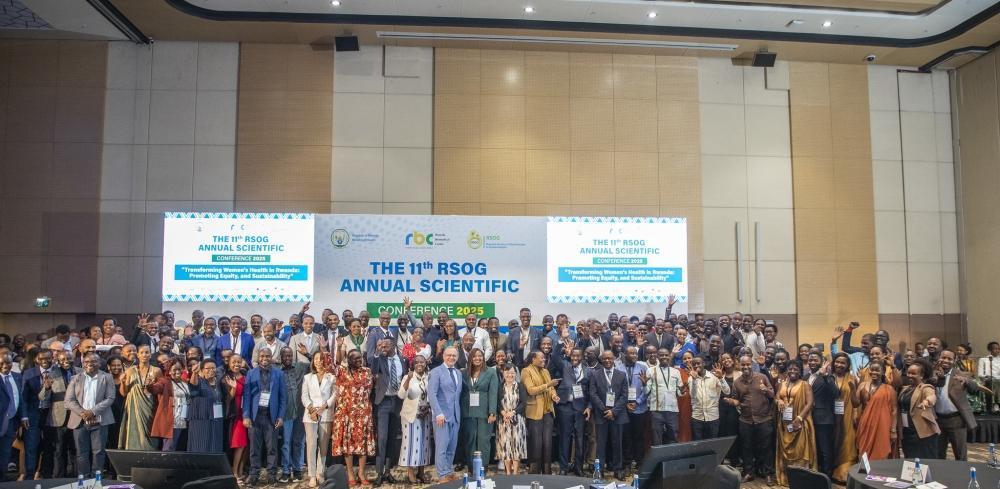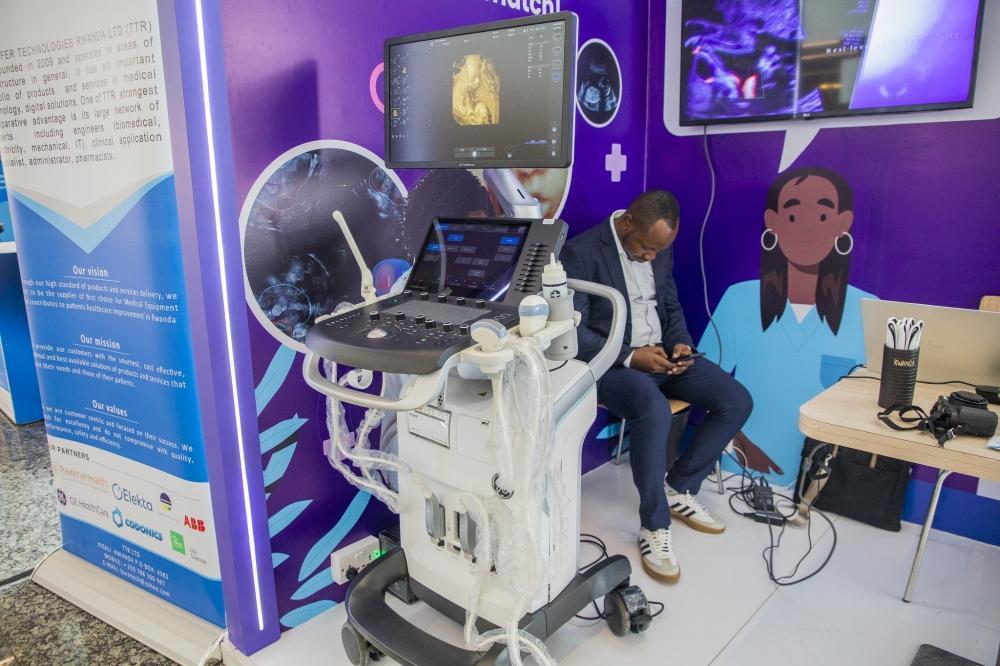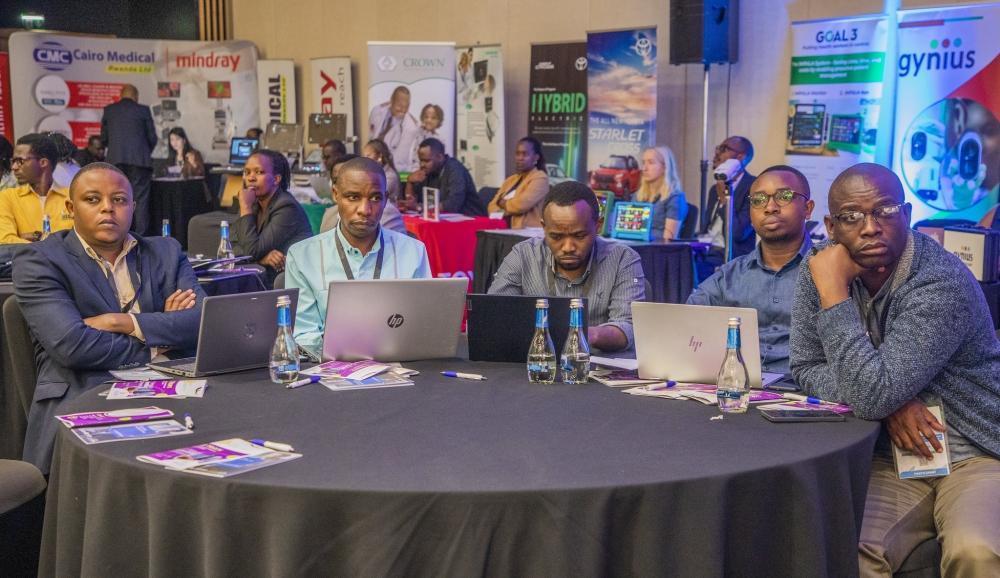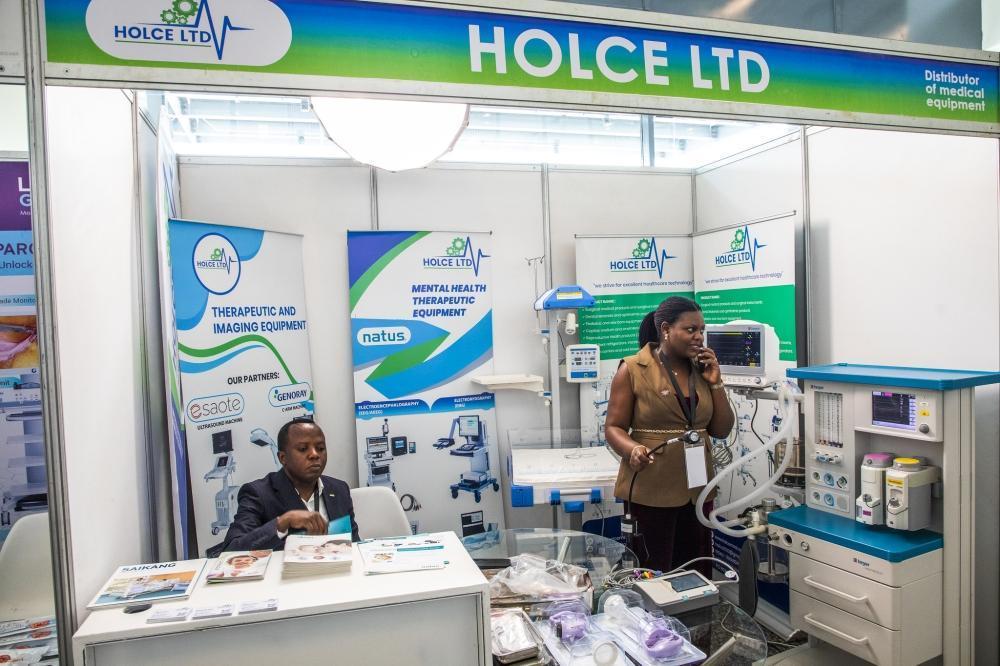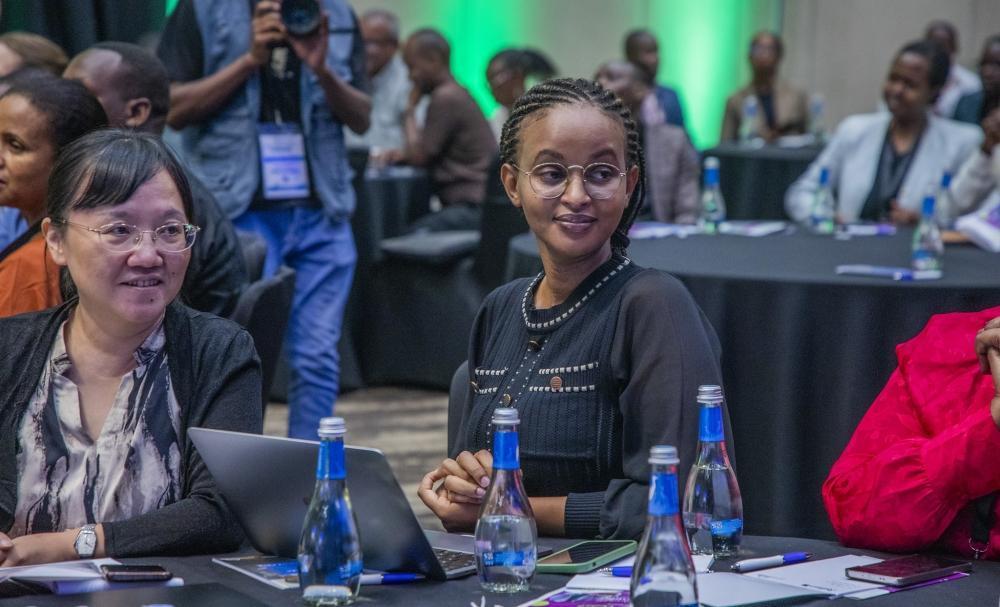Africa-Press – Rwanda. The Rwanda Society of Obstetricians and Gynaecologists (RSOG), in partnership with the Ministry of Health (MoH), Rwanda Biomedical Centre (RBC), and other key stakeholders, successfully hosted its 11th Annual Scientific Conference from August 28–29 at the Kigali Convention Centre. The conference was held under the theme “Transforming Women’s Health: Promoting Equity and Sustainability.”
The two-day event brought together obstetricians and gynaecologists, midwives, resident doctors, policymakers, researchers, and public health experts from Rwanda and abroad. Discussions focused on sexual and reproductive health and rights, maternal and neonatal health, equity in healthcare, access to services, mental health, and innovations aimed at advancing women’s health.
The conference opened with keynote addresses from a distinguished group of speakers, including Dr Victor Mivumbi Ndicunguye, President of RSOG, Lacy Hubbard, President and CEO of the Elekta Foundation; Prof. Frank Louwen, President-elect of the International Federation of Gynecology and Obstetrics (FIGO); Dr Theopista John Kabuteni, WHO Policy Advisor on Reproductive, Maternal, and Neonatal Health, Prof. Senait Fisseha, Vice President of Global Programs at The Susan Thompson Buffett Foundation; and Jeanne Umuhire, Deputy Director of the Rwanda Biomedical Centre and Guest of Honour.
In her remarks, Umuhire commended RSOG for its outstanding contribution to saving the lives of women and newborns across Rwanda.
She noted the importance of multidisciplinary collaboration in achieving the country’s health goals.
During the conference, they recognised best performers from different hospitals. Craish Bahizi
Challenges, progress
The conference took place amid progress in women’s health in Rwanda. Maternal mortality decreased from 210 deaths per 100,000 live births to 105 in 2023.
Participants explored strategies to sustain these gains while addressing challenges such as workforce shortages, geographical barriers, and limited access to sexual and reproductive healthcare.
Experts projected that maternal mortality could fall below 70 deaths per 100,000 live births within five years if current efforts and collaborations are strengthened.
It was noted that obstetricians play a vital role in improving newborn survival, with birth asphyxia and prematurity still among the leading causes of infant deaths.
RSOG called for stronger collaboration between obstetricians, gynaecologists, midwives, neonatologists, paediatricians, and public health professionals through joint planning, policy reviews, and updates of maternal and foetal health guidelines.
Experts insights
During a panel discussion, Stephen Rulisa, Professor of Obstetrics and Gynaecology at the University of Rwanda, said that most maternal deaths are well-known and preventable, with obstetric haemorrhage being the leading cause, accounting for 45% of cases.
He added that there is a need for strong hospital-level leadership to ensure the effective implementation of interventions.
Participants pose for a group photo at the event. The conference brought together more than 200 participants from over 15 countries. Craish BAHIZI
Sister Josephine Murekezi, Chairperson of the Rwanda Association of Midwives, noted the importance of community involvement in maternal health. She encouraged male partners, families, traditional leaders, and community health workers to actively support pregnant women and promote antenatal visits.
Dr Jean-Baptiste Ntihumbya, Director General of Health Quality Services at MoH, noted delays in care-seeking, gaps in ambulance coordination, and inconsistencies in care quality as key challenges.
A mini-exhibition at the venue where exhibitors showcase different medical services. Craish Bahizi
He added leadership, communication, and audits as vital tools for improvement.
In a side interview, RSOG president, Dr Mivumbi, noted ongoing efforts to address preventable maternal deaths caused by postpartum haemorrhage, infections, hypertensive disorders, and unsafe abortions.
RSOG is tackling these issues through policy advising, training healthcare providers, and advocating for better access to essential services and equipment.
He also outlined innovations, such as the rollout of the eMotive bundle for postpartum haemorrhage management, now used in nearly half of Rwanda’s facilities. This approach combines interventions and technologies like the Drape-based Rapid Estimation of Postpartum Blood Loss (DREPS) to improve diagnosis and treatment.
On capacity building, Dr Mivumbi noted that RSOG has expanded the OB-GYN residency programme at the University of Rwanda from 10 to 60 residents annually, across 10 hospitals, including nine in rural areas. This has greatly expanded access to reproductive health services outside Kigali. Mentorship programmes, continuous medical education, and webinars remain central to strengthening resident students and healthcare providers’ skills.
Dr Muhuza Marie Parfaite Uwimana, RSOG Managing Director, added that training resident doctors in RSOG’s affiliated hospitals equips resident students not only as skilled clinicians but also as future policymakers and leaders.
She noted the importance of grounding their training in public health and reproductive rights to strengthen advocacy for comprehensive sexual reproductive health services.
RSOG is working with MoH and RBC on Mission 2027, which focuses on eliminating cervical cancer, and Dr Uwimana calls for partners to join this noble initiative.
Voices from the field
Midwife Saidath Gato, from Partners in Health, noted access challenges in rural areas, particularly long travel distances and staff shortages that discourage women from returning for care. She also added that there are also gaps in maternal mental health support.
Dr Issa Ngabonziza, Director General of Byumba Level 2 Teaching Hospital, described how residency training programmes have strengthened comprehensive maternal health services. Community health workers now play an expanded role in monitoring high-risk pregnancies and promoting safe practices.
Dr David Tuyisenge, a gynaecologist at Kabgayi Level 2 Teaching Hospital, pointed to the MoH’s “4×4 Reform,” which aims to quadruple the number and quality of healthcare professionals in four years.
While RSOG has expanded its residency intake, he cautioned that maintaining quality is a challenge due to limited clinical instructors. He noted the need for career guidance to attract more young professionals into medical specialisations.
Recognising contributions
During the conference, RSOG honoured 21 senior members for their lifelong contributions to women’s health in Rwanda. These pioneers were celebrated for their dedication to training, mentorship, and strengthening society.
Among the awardees were Dr Jean Damascene Nsanzabera, Dr Stephen Rulisa, Dr Patrick Dr Mulindwa, Dr Aime Rurangwa, Dr Aline Mukundwa, Dr Rwibasira John Muganda, Dr Jean Chrysostome Nyirinkwaya, Dr Gaspard Ntahonkiriye, Dr Athanase Sengorore, Dr Vincent Kanimba, Dr Jean Claude Nkundabagenzi, Dr Jean Dieudonnee Gatsinga, Dr Patrick Bagambe, Dr Jules Mushingantahe, Dr Alphonse Butoyi, DrMayele Iba, Ndahiro Athanase Kanimba, Dr Andre Gakwavu, Prof Eugene Ngoga, Dr Subira Manzi, and Dr Diomede Ntasumbumuyange.
Next steps
RSOG stated its commitment to advancing comprehensive sexual and reproductive health, including safe abortion, family planning, contraception, fertility, maternal mental health, and the overall well-being of mothers and newborns.
For more information, RSOG’s offices are located at Kacyiru Executive Apartment, Building B, 2nd Floor. Additional details are available on the website www.rsog.org.rw or via email at [email protected].
The RSOG held a pre-conference leadership training to equip clinicians with the skills to lead beyond the clinic.
For More News And Analysis About Rwanda Follow Africa-Press

